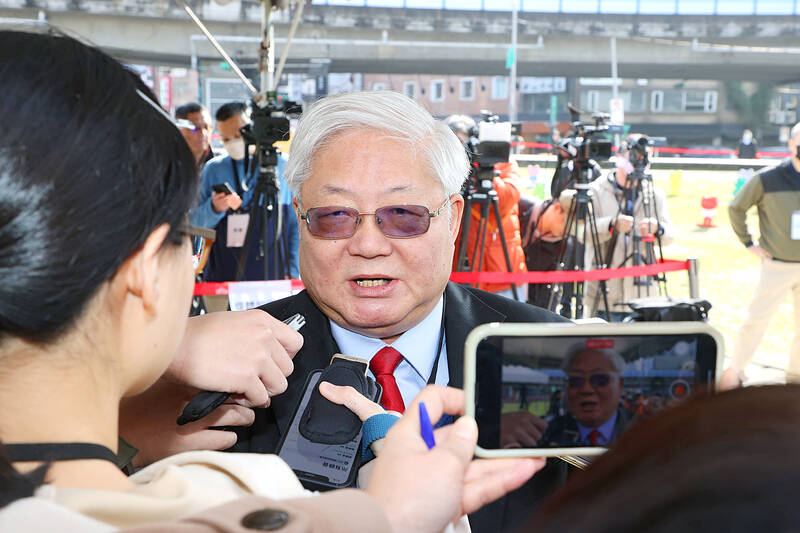More than 2,000 people die of stomach cancer every year in Taiwan, and as Helicobacter pylori infection is a strong risk factor, people should avoid sharing food and utensils, the Health Promotion Administration (HPA) said.
Stomach cancer is the eighth-most common and deadliest cancer in Taiwan.
More than 4,000 people are diagnosed with stomach cancer every year, while more than 2,000 people with it die, data shows.

Photo: CNA
H. pylori is a major risk factor for stomach cancer, as it is linked to 80 to 90 percent of stomach cancer cases, the HPA said in a statement.
Maintaining good lifestyle habits and reducing the risk of H. pylori infection could greatly decrease the risk of developing stomach cancer, it said.
The risk of stomach cancer in people with H. pylori infection is about six to 10 times higher than others, and the WHO in 1994 classified H. pylori as a Group 1 carcinogen, it said.
H. pylori could cause chronic gastritis and ulcers, and long-term inflammation of the stomach lining could lead to the destruction of gastric glands and gastric mucosal atrophy, resulting in the precancerous condition of gastric intestinal metaplasia and eventually stomach cancer, it said.
H. pylori is mainly transmitted from person to person through the fecal-oral route, but it could also be transmitted through saliva, it said, adding that sharing food and utensils, and drinking from the same cup with someone infected could increase infection risk.
People could take a C-13 urea breath test, H. pylori stool antigen (HpSA) test, or a gastroscopy to check whether they are infected, it said.
The agency in August last year said it launched a trial program in nine administrative regions offering a free HpSA test to people aged 45 to 74.
The program has been expanded to 17 administrative regions this year, so people who would like to get the test can ask a local health facility about its availability, it said.
HPA Director-General Wu Chao-chun (吳昭軍) said people should protect their gut health by eating healthy food, practicing good hygiene, doing exercise regularly, avoiding smoking and drinking alcohol, and seeing a doctor if they develop gastrointestinal symptoms.

The manufacture of the remaining 28 M1A2T Abrams tanks Taiwan purchased from the US has recently been completed, and they are expected to be delivered within the next one to two months, a source said yesterday. The Ministry of National Defense is arranging cargo ships to transport the tanks to Taiwan as soon as possible, said the source, who is familiar with the matter. The estimated arrival time ranges from late this month to early next month, the source said. The 28 Abrams tanks make up the third and final batch of a total of 108 tanks, valued at about NT$40.5 billion

Two Taiwanese prosecutors were questioned by Chinese security personnel at their hotel during a trip to China’s Henan Province this month, the Mainland Affairs Council (MAC) said yesterday. The officers had personal information on the prosecutors, including “when they were assigned to their posts, their work locations and job titles,” MAC Deputy Minister and spokesman Liang Wen-chieh (梁文傑) said. On top of asking about their agencies and positions, the officers also questioned the prosecutors about the Cross-Strait Joint Crime-Fighting and Judicial Mutual Assistance Agreement, a pact that serves as the framework for Taiwan-China cooperation on combating crime and providing judicial assistance, Liang

A group from the Taiwanese Designers in Australia association yesterday represented Taiwan at the Midsumma Pride March in Melbourne. The march, held in the St. Kilda suburb, is the city’s largest LGBTQIA+ parade and the flagship event of the annual Midsumma Festival. It attracted more than 45,000 spectators who supported the 400 groups and 10,000 marchers that participated this year, the association said. Taiwanese Designers said they organized a team to march for Taiwan this year, joining politicians, government agencies, professionals and community organizations in showing support for LGBTQIA+ people and diverse communities. As the first country in Asia to legalize same-sex

MOTIVES QUESTIONED The PLA considers Xi’s policies toward Taiwan to be driven by personal considerations rather than military assessment, the Epoch Times reports Chinese President Xi Jinping’s (習近平) latest purge of the Chinese People’s Liberation Army (PLA) leadership might have been prompted by the military’s opposition to plans of invading Taiwan, the Epoch Times said. The Chinese military opposes waging war against Taiwan by a large consensus, putting it at odds with Xi’s vision, the Falun Gong-affiliated daily said in a report on Thursday, citing anonymous sources with insight into the PLA’s inner workings. The opposition is not the opinion of a few generals, but a widely shared view among the PLA cadre, the Epoch Times cited them as saying. “Chinese forces know full well that